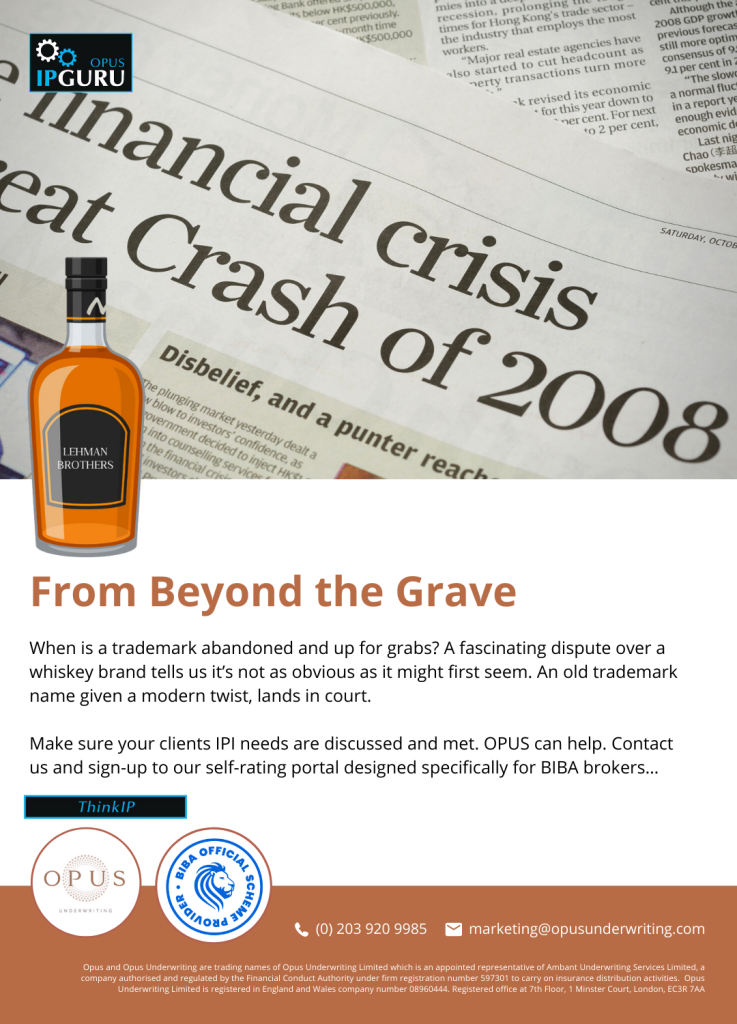Whiskey Sour
Brand-building can be a subtle art. It’s not always obvious. This we know. Sometimes it’s just downright opportunistic. Who would have thought to build a brand upon the biggest bankruptcy in American history and the Great Recession? A British entrepreneur – obviously. Go Bulldog!
James Green and his company Tiger Lily Ventures Ltd. spotted an opportunity when the trademarks of Lehman Brothers lapsed in 2013. Tiger Lily filed an application to re-register “Lehman Brothers” mark as a name for beer and spirits and for bar and restaurant services. Barclays Capital and Barclays PLC purchased the Lehman Brothers mark in 2008 when they bought the fire-charred remnants of the fourth biggest investment bank in the U.S. following the financial crash. Realising it was a mistake to let the mark lapse, Barclays opposed Tiger Lily’s application and thus both companies became acquainted with the Trademark Trial and Appeal Board.
Liquid sunshine
Mr. Green had big plans for the Lehman Brothers mark. He styled and produced three whiskeys on it with, it should be recorded, a good mix of wit and panache. They were branded: Snapfire, Evergreen and Ashes of Disaster.
The three whiskeys were to “tell the tale of the rise and fall of Lehman Brothers.” Here’s how.
“Snapfire” it is suggested, is“…perfect with reckless manoeuvres, long gambles, and explosive consequences. Drink alone, if possible.”, and
“Evergreen” was marketed as ideal “…when fortune is with you and you are riding your luck. Tastes best when you are sitting on top of the world.”
“Ashes of Disaster” claims to have a “…wicked suggestion of burning banknotes, a hint of ripe autumn fruit about to fall.”
It says much about human nature that “Ashes” proved to be the most popular of the range. A tot of the strong stuff being required when all around you turns to dust; perhaps. Whether folk agree or not that whiskey is a ‘top of the world’ or ‘bottom of the heap’ type of drink, that was the Tiger Lily play. Or at least it was until lawyers got involved.
What whiskey will not cure…
The legal battle between Tiger Lily and Barclays is an interesting one. It’s classic, multi-faceted, intellectual property court fodder. In essence, Tiger Lily claimed in the original hearing in 2020 and earlier last month on appeal, its application for registration of the Lehman Brothers mark was based on
- Its intention to evoke a parody of the name,
- The mark had been abandoned and there was no bona fide use of the mark as a consumer-facing service anymore, therefore the public would not be confused between the ownership of an investment bank and the whiskey brand.
Parody and sense of humor failure
The court at first instance was not convinced by the parody defence. It said a parody relies upon a difference from the original mark, presumably a humorous difference to produce its desired effect, the marks were identical, so the parody argument fell short.
Abandonment and confusion
On paper, this argument had a far better chance of success. Nevertheless, the Trademark Board rejected the argument for abandonment saying that, although Barclays made no new commercial offerings under “Lehman Brothers,” the name was still used in terms of winding down the company, as well as the bankruptcy estate using the mark to sell its assets.
The confusion part of the claim is complicated. Naturally, the clue is in the title. The Board at first hearing and at the appeal, considered the requisite eight factors to assess whether confusion between related goods is likely:
1 Strength of the mark
2 Proximity of the goods
3 Similarity of the marks
4 Evidence of actual confusion
5 Marketing channels used
6 Type of goods and the degree of care likely to be exercised by the purchaser
7 Defendant’s intent in selecting the mark; and
8 Likelihood of expansion of the product lines.
Long legal story short, Tiger Lily lost its appeal to register the name “Lehman Brothers” for its intended purposes and Barclays had sufficient evidence on each of the above counts to demonstrate no abandonment and that confusion remained a likelihood. What now happens to the novelty whiskey remains to be seen. Could it be a collector’s item for future entrepreneurs?
Glass half empty
This account of a small company having its idea snuffed-out by a mega-corporation supported by ‘impenetrable’ laws, kind of makes you feel sorry for Tiger Lily. A defunct investment bank and a brand of whiskey, how could you possibly confuse the two? Harsh though it is, the lesson is a simple one. It’s never your idea that’s the problem – it’s another’s infringement claim.
Murray Fairclough
Development Underwriter
OPUS Underwriting Limited
+44 (0) 780 145 9940
underwriting@opusunderwriting.com
Research by Ben Fairclough








